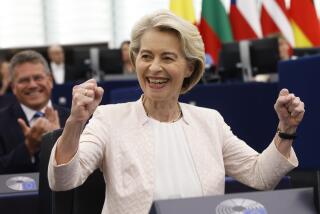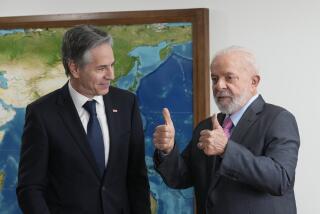WORLD CUP USA ’94 / THE FIRST ROUND : Havelange Sets Goals for Sixth FIFA Term : Soccer: Brazilian, 78, says governing body will reach out to impoverished children.
- Share via
CHICAGO — Joao Havelange, the 78-year-old Brazilian who has ruled FIFA, world soccer’s governing body, with an iron hand for the last 20 years, was reelected by acclamation to a sixth four-year term Thursday.
The dinosaurs at the Field Museum here have smiled more recently than the crusty Havelange, so it was no surprise that he accepted the unanimous approval of the 49th FIFA Congress as no more than his due.
Regarded as one of the most powerful men in international sports--he also wields a lot of clout in the International Olympic Committee--Havelange said he would concentrate on achieving three things during his final four years in office:
--Improving communication among FIFA’s 191 member nations by making sure that every national soccer federation has instant access to FIFA and to each other through telephone and facsimile service, which FIFA will try to provide, perhaps through a sponsor.
--Creating what he called a “documentation center” that is in effect a central electronic-communications and media-resource center in a building already under construction alongside FIFA headquarters in Zurich, Switzerland.
--Establishing a FIFA foundation that will work through three Swiss banks to help children in impoverished and underdeveloped countries around the world.
This last promise drew the loudest applause from the delegates because FIFA often has been criticized for not putting its commercial success to better, more humanitarian use.
“We have an obligation to reach out to the less-developed countries and to send to the children everywhere a message that life can be better,” Havelange said.
The former Olympic swimmer and water polo player turned businessman and sports leader has made his career in FIFA by courting the votes of the African, Asian and CONCACAF (North and Central American and Caribbean) confederation members.
It was Havelange who expanded the World Cup from 16 to 24 teams in 1982. It was Havelange who established the under-20 and under-17 and women’s and five-a-side (indoor) world championship tournaments. It was Havelange who proposed that Asia stage the 2002 World Cup and that Africa be seriously considered as a World Cup host by 2006.
And it was Havelange who saved his job earlier this year when he again expanded the World Cup field, this time from 24 to 32 for the 1998 tournament in France.
After the debacle of the World Cup draw in Las Vegas last December, when the autocratic Havelange denied Pele a role in the ceremony after Pele had made accusations of financial wrongdoing against the president of the Brazilian federation--who just happens to be Havelange’s son-in-law--many thought Havelange had overstepped his bounds.
For a while, there was talk of a European challenge to his presidency, but the Brazilian shot down all such ideas by again increasing the World Cup field to give the African and Asian and CONCACAF regions more berths in the tournament and holding out the same hope for Europe.
Havelange denied that the votes of FIFA delegates on a variety of issues showed a growing split between traditionally powerful Europe and South America on one hand and Africa, Asia, Oceania and CONCACAF on the other.
“I am not concerned or worried,” he said. “There is no split.”
The voting, however, indicated otherwise.
For example, delegates rejected a proposal by Tunisia that the World Cup and the four other FIFA world championships be rotated among the five major confederations. That would have meant that the World Cup would be played in Europe only once every 20 years. The vote was not close. The proposal received only 59 of the 105 votes it needed for passage.
Similarly, a FIFA executive committee’s proposal that only referees and linesmen from neutral countries be allowed to officiate so-called “A” international games, including “friendlies,” was voted down when the less prosperous countries said they could not afford the cost of providing officials from a neutral country.
After the vote, Havelange warned that the issue would be brought up again, because a number of federations are insisting on it and FIFA wants to ensure that top games are officiated “by referees who are up-to-date on the changes in the game”--a not-so-subtle hint that he was displeased with the measure’s failure to pass.
Among other actions taken by the congress were the addition of 14 national federations to FIFA, bringing the total number of member nations to 191. When the organization was founded in 1904 it had seven members.
More to Read
Go beyond the scoreboard
Get the latest on L.A.'s teams in the daily Sports Report newsletter.
You may occasionally receive promotional content from the Los Angeles Times.






